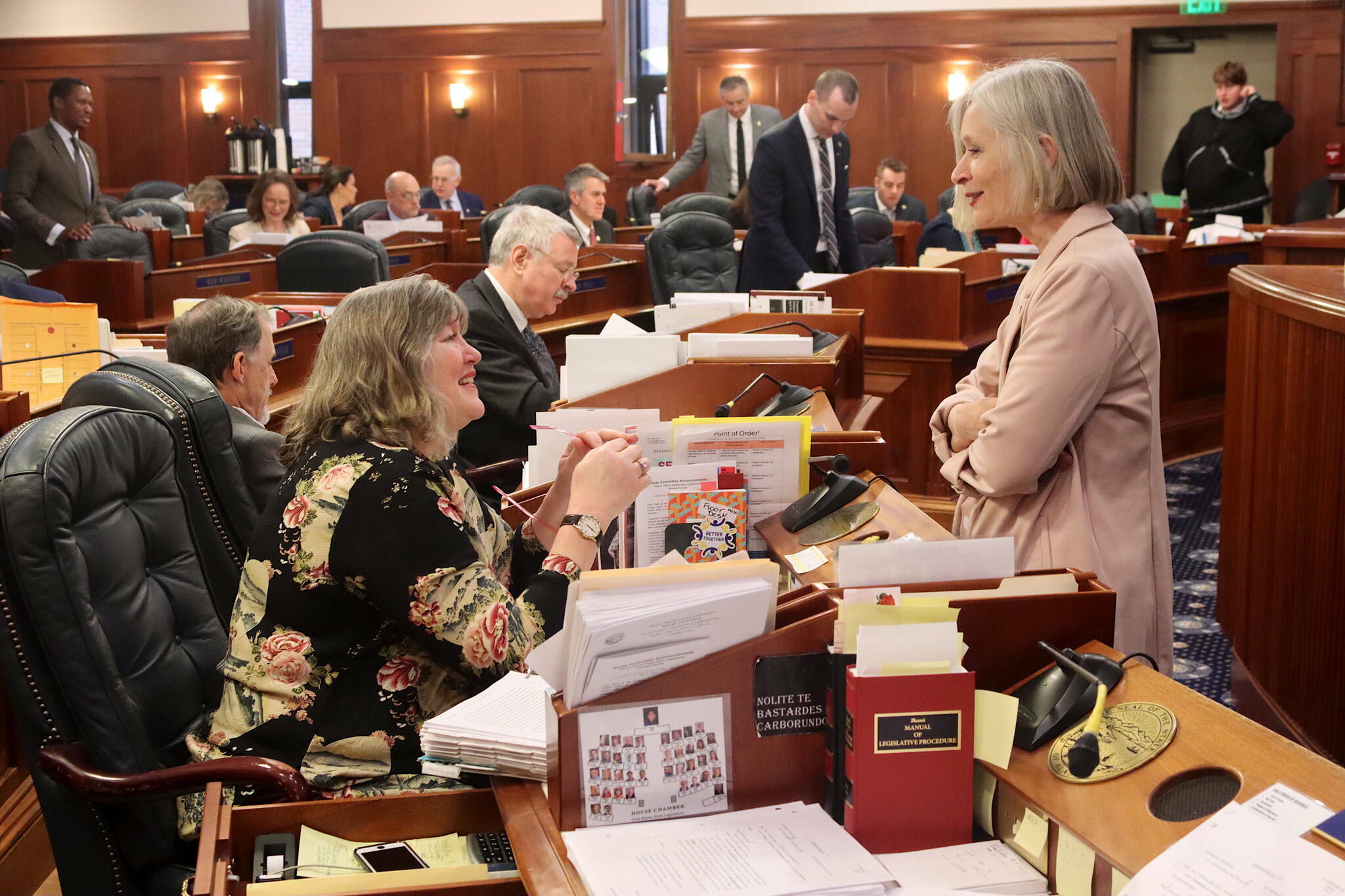An initial batch of 81 prefiled bills and resolutions contains a lot of greatest hits from the Alaska State Legislature’s past (moving sessions to Anchorage, eliminating abortion rights) and jumping on the latest political bandwagons (prohibiting DEI policies on state boards, banning cellphones in schools).
The 37 House bills, 39 Senate bills and five Senate resolutions were published Friday, with a second batch of prefiled bills scheduled for release next Friday, Jan. 17, prior to the start of the session on Jan. 21.
Four of the first batch are from Juneau’s three Democratic legislators — two by Rep. Andi Story involving youth voter registration and student loans, and two by Sen. Jesse Kiehl involving public employee pensions and address confidentiality for certain individuals such as crime victims. All of the bills have been introduced in previous years, but the delegation’s efforts may be more successful this year since the House has flipped from a Republican majority to a bipartisan one where Democrats outnumber Republicans, with the Senate returning a similar majority following November’s election.
All three members of Juneau’s legislative delegation are scheduled to discuss issues and goals for this year’s session during a town hall at 5:30 p.m. Monday at the Dzantik’i Heeni campus.
Some of the other prefiles are on predictable heavyweight matters likely to be discussed at length, including royalty payments for oil, and how Permanent Fund dividends are calculated and paid. Others are likely to get attention because of their easy ability to spark water coolor debate such as banning styrofoam food containers and eliminating Daylight Savings Time.
A bill likely to get early and serious consideration is the school cellphone ban in Senate Bill 18 by Bill Wielechowski, an Anchorage Democrat, since Alaska state government officials are already taking steps toward joining other states with such bans. The Alaska Board of Education and Early Development ordered such a policy to be drafted last year, some districts have already imposed one, and the Juneau Board of Education discussed the issue this week during a committee meeting.
SB18 would ban cellphones and other “wireless telecommunications devices” not issued by a school during regular school hours, including lunches and passing periods, although exceptions would be permitted for emergencies.
Among the other education-related bills introduced so far by majority caucus members are mandating free school breakfasts and lunches for students (HB 12 by Maxine Dibert, D-Fairbanks), and implementing a government and civics curriculum in public schools (SB23 by Senate President Gary Stevens, R-Kodiak). Among the minority caucus education bills is mandating schools have one or more armed “qualified persons,” and pay for the training required, unless no such person can be found (SB 3 by Sen. Shelley Hughes, R-Palmer).
Both of Story’s bills are also related to students, befitting her primary issue focus as a legislator and current role as co-chair of the House Education Committee.
• HB21 would allow voter preregistration for minors at least 16 years of age, which Story has said is shown to significantly increase youth participation in elections in other states with such laws. A similar bill last session failed to make it out of committee.
• HB28, dubbed the “Come Back Home” bill when introduced during the last session, creating a three-year pilot program providing postsecondary graduates up to $8,000 to repay student loans for each year worked in Alaska during that period.
Retirement benefits for public employees, including educators, were a major issue of debate during the past session, but an attempt to restore a traditional guaranteed pension system eliminated in 2006 rather than the current 401k-style plan in which benefits are not guaranteed. A bill that passed the Senate last year stalled and died in the Republican-led House — so not surprisingly efforts to revive the legislation are back with a Democratic-leaning House.
Among those efforts is Kiehl’s SB27, which would allow public employees to choose between the state’s existing 401k-style program or a new pension program. His other prefile, SB31, would establish an opt-in address confidentiality program for law enforcement officers and victims of crimes such as domestic violence. A version of the latter, much like pension reform, passed the Senate last year and failed in the House.
The more Democratic-leaning Legislature — a contrast to the national trend last year that saw Republicans seize control of both chambers of Congress as well as the White House — means that while some proposals getting national prominence will be introduced in Alaska, they likely won’t get far at the state Capitol.
Attempts to eliminate abortion rights in Alaska, which are protected by the privacy clause in the Alaska Constitution, have failed for years. Sen. Hughes’ SJR1, seeking to put a constitutional amendment on the ballot nixing that right, isn’t likely to fare any better this session. Similarly, voters in November narrowly opted to retain ranked choice voting and open primaries, so eliminating them with the passage of HB19 by Rep. George Rauscher, R-Sutton, is a dubious prospect.
• Contact Mark Sabbatini at mark.sabbatini@juneauempire.com or (907) 957-2306.

